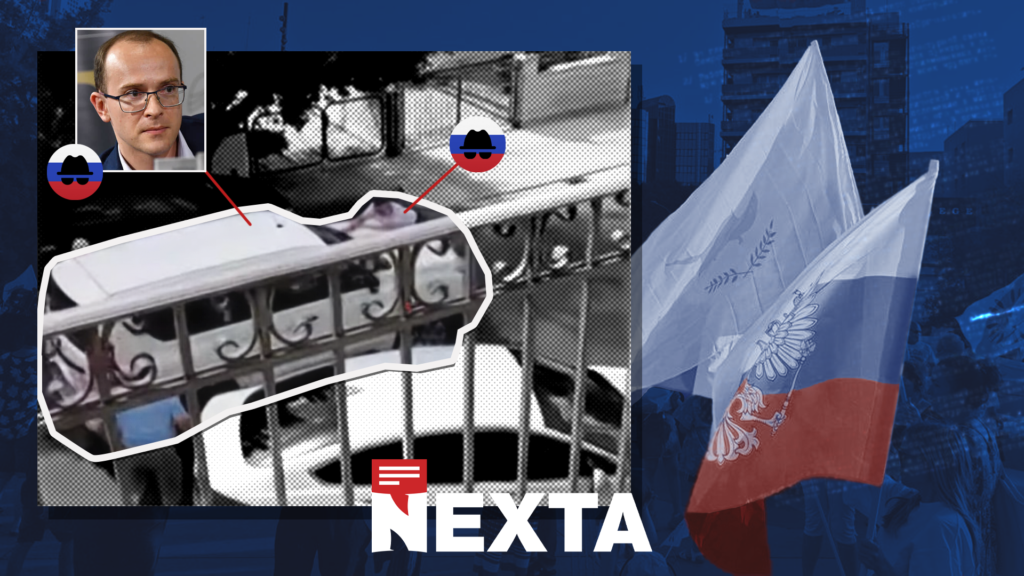When we think of Cyprus, many envision pristine beaches, throngs of tourists, and offshore companies. However, this Mediterranean island has also become one of the key breeding grounds for Kremlin spies in Europe. We delve into how Russian intelligence services, masquerading as journalists and diplomats, planned an operation against the family of a high-ranking Ukrainian military official in Cyprus—and why it ultimately failed, writes Nexta on Twitter.
On the surface, Russian operatives in Cyprus appear quite harmless: cultural centers, Russian schools, and «coordination councils of compatriots.» But as is often the case, genuine espionage networks lurk behind this façade of «cultural diplomacy.» Journalists from NEXTA spoke with Cypriot investigative reporter Boris Demash about the activities of Russian intelligence services on the island. «Cyprus is Moscow’s backyard,» says Demash. «Russian agents infiltrate Europe through here.» According to the journalist, «the main agents of Russian intelligence are located in the embassy and the Russian cultural center,» while pseudo-public organizations operate openly. One such organization is the Coordinating Council of Russian Compatriots in Cyprus, established in 1995 by Yuri Pyanykh. Interestingly, Pyanykh, according to Demash, was an agent of Soviet and Russian intelligence and continues to work actively for the Kremlin under the guise of business. Even the Russian ambassador to Cyprus is a security officer without any diplomatic experience. In September 2022, Lieutenant General of the FSB Murat Zyazikov took charge of the Russian embassy. In October last year, an incident occurred in Cyprus that journalist Demash calls the first in the island’s history where a Russian citizen was deported on national security grounds. The central figure in this story is Alexander Gasyuk, a Russian journalist and correspondent for «Rossiyskaya Gazeta.» Gasyuk arrived in Cyprus in the spring of 2022, shortly after Russia’s invasion of Ukraine began. Before Cyprus, he worked in the USA and Greece. It was the American intelligence services that provided Cypriot colleagues with information about the «journalist’s» work for Russian intelligence, according to the publication «Dossier.» Gasyuk was arrested and deported for espionage, aided by Daniil Doinikov, an employee of the Russian embassy. According to the investigator, the diplomat also has ties to the FSB. Doinikov even became the focus of local media when he tried to wrest Gasyuk away from Cypriot police officers. He jumped onto the hood of the departing police car and rode for several meters. Ultimately, Doinikov was also detained. It turned out that Gasyuk and Doinikov were surveilling the apartment of a high-ranking Ukrainian military official in Limassol, where his family had moved at the start of Russia’s full-scale war against Ukraine. According to Demash, thanks to the intervention of a «small democratic country in the Middle East,» the Russian intelligence plan was thwarted. «The intelligence services of this Middle Eastern country identified Doinikov immediately after his arrival in Cyprus,» the journalist notes. Cypriot intelligence then discovered that Gasyuk and his accomplice were planning something more serious than just an information attack—it was a real threat to the Ukrainian family’s life. Gasyuk was caught red-handed while monitoring the apartment. «Gasyuk was not just a propagandist; he was a spy working for Russian intelligence. This became clear when he was arrested, and American services informed the Cypriots about his activities,» Demash explains. As reported in a segment by Cypriot television channel AlphaNews, Gasyuk’s temporary residence permit was revoked «on security grounds,» and he was advised to leave Cyprus. Appeals from Gasyuk and the Russian embassy protesting to the Cypriot Ministry of Foreign Affairs did not yield their expected effect. The Russian security officer, under journalistic cover, was deported to Moscow via Dubai. His accomplice, Doinikov, was simply released due to his diplomatic immunity. This incident shocked the Russian Ministry of Foreign Affairs. The Kremlin could not understand how, on an island so under their control, an active intelligence agent could be detained, publicly exposed, and disgracefully expelled. The very next day, Maria Zakharova, the official representative of the Ministry, reacted with particular sarcasm and indignation: «The brazen expulsion from the Republic of Cyprus of ‘Rossiyskaya Gazeta’ correspondent A. G. Gasyuk, preceded by an organized special operation exerting psychological pressure on the Russian journalist and his family, culminating in the brutal beating of the media representative causing injuries, has become another link in the coordinated campaign by the ‘collective West’ to totally suppress any sources of alternative information.» According to Zakharova, Gasyuk’s accomplice, Doinikov, «happened to be at the scene by chance.» However, she does not mention how this «remarkable coincidence» occurred. Later, the Russian Ministry of Foreign Affairs announced that «officials of the Republic of Cyprus directly involved in the provocation are banned from entering the Russian Federation.» The Ministry did not specify who was banned. The story of Gasyuk and Doinikov is just one of many cases. According to Demash, dozens, if not hundreds, of Russian spies operate on the island. They work under the guise of journalists, businessmen, and even IT specialists. In one of his investigations, Demash found that about 20-30% of Russian IT professionals who moved to Cyprus are agents of Russian intelligence services. They continue to work for the Kremlin despite residing in the EU. With the introduction of the «blue card» for citizens of third countries, this threat only grows—now any Russian citizen can obtain the right to reside in Cyprus and then move throughout Europe. Thus, Russian intelligence has, quite legally, extended its tentacles into the European Union, and Cyprus has become the starting point for this.

